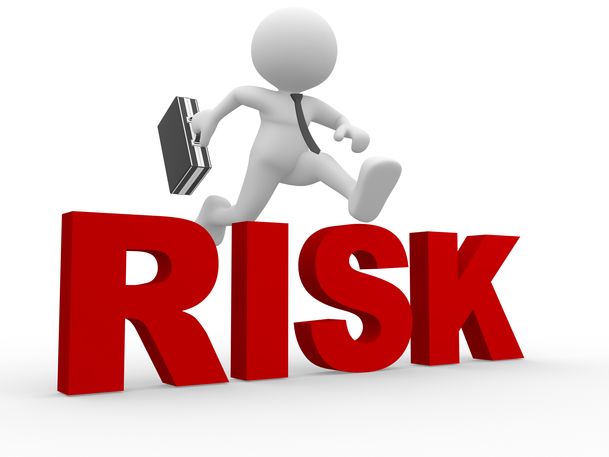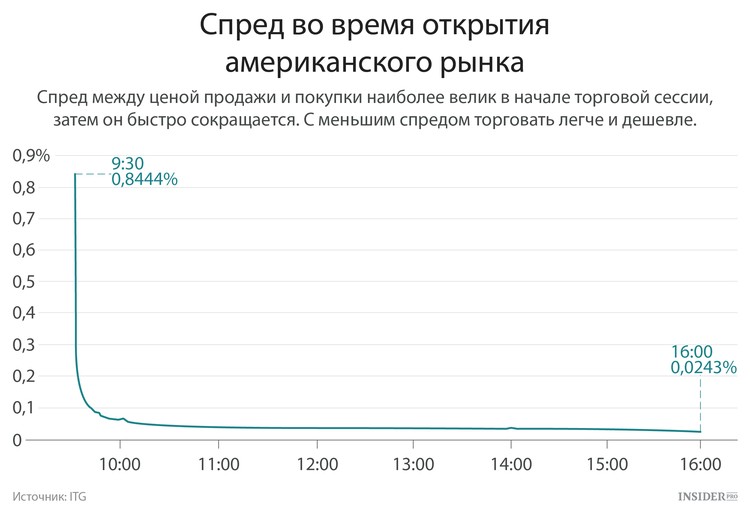
Statistics show: individual investors take excessive risk, trading stocks immediately after opening.
Increasing volatility in the US stock market hit investors especially hard, who prefer to buy and sell stocks soon after the opening of trading. Usually this time is the most dangerous of the whole day - and not only in the American market.
Traders and financial observers talk about the propensity of individual investors for maximum activity immediately after the market opens. At this time, the probability of getting the best price is lower, and her hesitation, usually, Stronger (Recall, American stock market открывается в 9:30 local time or at 16:30 according to Moscow).
However, within a few minutes, the gap between the selling price, known as Ask, and the purchase price, known as Bid, declines sharply. This process continues until the end of the trading session.. Large fluctuations in the stock market in recent weeks have only amplified the effect.
The smaller the gap, or spread, the better for the investor - the likelihood of overpaying for shares or selling them below market value decreases. The wider the spread, the higher the risk of overpaying per share. In conditions, when stock indices are in negative territory at the end of the year, this can hit the return on investment hard.

According to data for the first half of the year, collected by the brokerage company ITG, in the first minute of trading, the average spread between the Bid and Ask prices of shares from S&P 500 was 0,84%. After 15 minutes the gap narrowed to 0,08%, and in the last minutes of the trading session fell to 0,03%.
In monetary terms, this difference is small.. but, if we take into account the total trading volume, investors, prone to act immediately after opening, lose significant amounts.
For example, в понедельник сразу после начала торгов спред по акциям Scripps Networks Interactive (NYSE: SNI) was $0,35, or 0,66%. By the end of the day, it had shrunk to $0,01, or 0,02%.
Scott Kyuubi, chief strategist of CLS Investments LLC - company, exchange-traded fund investor, He speaks:
“After waiting half an hour after the market opens, you can significantly reduce trading costs and reduce the risk of a bad deal ".
According to him, across 30 minutes after the opening, the spread between the buy and sell prices falls, and large price fluctuations subside:
"By this time, all orders, exhibited at night and early in the morning, исполняются, therefore large price fluctuations subside ".
It is necessary to make a reservation: volatility can be useful in some cases, allowing an investor to buy or sell shares at a better price.
After analyzing the day's news, individual investors usually place orders in the evening, using online access to your brokerage accounts. That is why the volume of orders is high, executed immediately after opening.
According to the research and consulting company TABB Group, about 15% of the daily trading volume falls on the orders of individual investors.
In general, the main trading volume is grouped around the opening and closing of the market., while large institutional investors, usually, enter the market closer to the close. According to Credit Suisse, in 2014 year for the first 30 minutes after opening took more than 13% of the daily trading volume - this value has been stable over the past five years. На первые 10 minutes took 5% от общего объема сделок.
24 in August, the habit of placing orders before the market opened worked against many ordinary investors. On that day, the Dow Jones Industrial Average lost more than 1000 points, and stock spreads widened sharply. Over the next half hour, the index cut about half of its morning losses..
Professionals prefer to stay away from the market when spreads widen. They know, that after their reduction, prices are highly likely to be more profitable. But if the client insists, financial advisors have no other choice, except to obey his will.
In the evening 23 August, one of the clients called Stephen Tray, CEO of the investment company Wealth Care LLC (assets under management - 250 million dollars), and ordered to sell all shares. В конечном итоге ее удалось убедить повременить с продажей основной части инвестиций и реализовать только некоторые фонды ETF (mutual funds, shares of which are traded on the stock exchange).
Early monday morning, 24 august, Stephen placed sell orders, partly fearing a larger market crash. At the peak of the crisis, shares of one of the exchange-traded funds - iShares Core S&P Small Cap ETF - Lost 30% свой стоимости, before the situation stabilized. Stephen estimates, the collapse and subsequent recovery of exchange-traded funds cost his client several thousand dollars. He tells:
"I sat, looked at what was happening and thought: "Oh my God, это безумие!“. Then I had no reason to believe, that everything will not turn out so bad ".
Exchange-traded funds are in the spotlight after the August fall. They are popular with investors, therefore, many people suffered from their sharp fall. On that fateful day, many ETFs fell more., than shares, which form the basis of their assets.
Stock Markets Around The World Collapse On Investor Concerns About The Slowing Chinese Economy And Its Impact On Global Growth. Increases uncertainty and the Federal Reserve, who could raise interest rates following this week's meeting. On Monday, the Dow Jones Industrial Average lost 62,13 point and closed at 16 370,96. In this way, its decline since the beginning of the year was 8,1%.
According to Stephen Quirk, Senior Vice President of the Trading Division of TD Ameritrade Holding, one of the largest brokerage companies in the United States, — 24 August trading volume was four times the average. In the first half hour, the trading volume turned out to be 10 times above average. Fidelity Investments also reports high investor trading activity that day.. Fidelity Senior Vice President Gregg Murphy says:
“Usually opening Monday is one of the busiest moments of the week., as orders arrive on the market, accumulated over the weekend. The main trading volume takes place in the first 30 minutes after the market opens ".
Chris Vorvald, one of the partners of financial advisory firm Truepoint Wealth Counsel, prefers not to trade at the very beginning of the day.. However, sometimes he has to do it due to customer requirements.. The recent surge in activity and the fall of the market clearly demonstrated the whole danger of trading immediately after the opening - this is what he is trying to convey to his clients., recommending avoiding hasty emotional decisions, based on fluctuations in the first minutes of trading.
"Usually, there is an overreaction to nightly news or news from other markets in the morning. In the event of a sharp fall, wait, until the market calms down. Then you will have a better idea of the current real price level ".
A source: The Wall Street Journal
Перевод insider.pro
